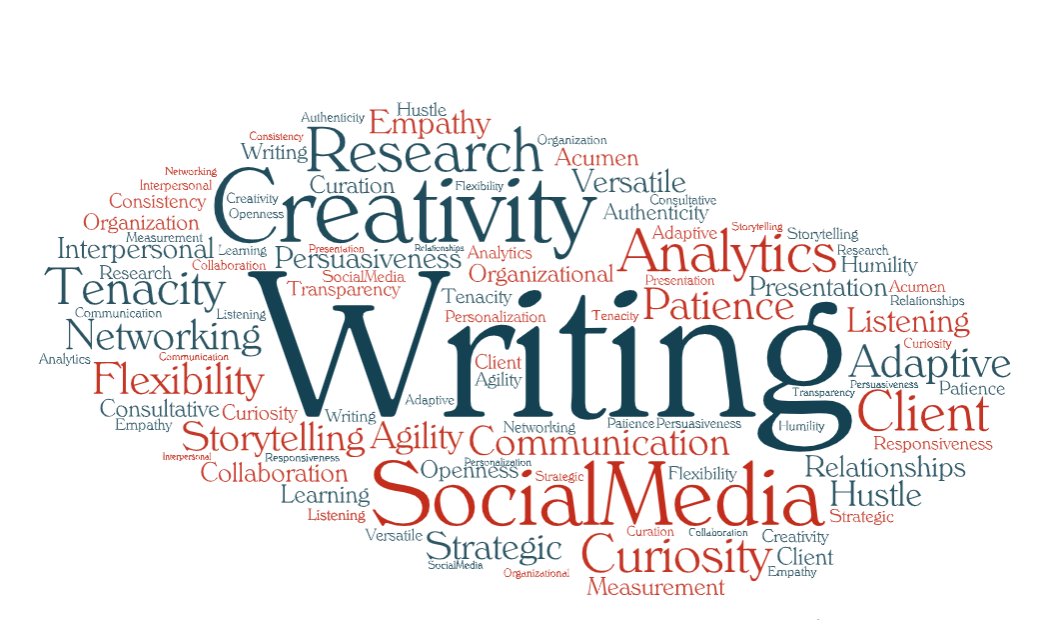While designing a recent webinar on the subject of preparing PR students for an era of digital disruption, my colleagues Christina Inge and Ed Powers and I pondered the skills required to thrive in the field.
 Our thought process was informed by the work of the Page Society. Page, a global association of public relations and communications executives, has done excellent work on what it calls “CommTech.” What does CommTech encompass? The digital tools, collaboration platforms, and data analytics that enable us to personalize engagement with stakeholders in ways that were inconceivable not that long ago. According to the Page research, CommTech “demands new team configurations, new roles and skill sets, new KPIs, new budgeting priorities and a truly Agile culture.”
Our thought process was informed by the work of the Page Society. Page, a global association of public relations and communications executives, has done excellent work on what it calls “CommTech.” What does CommTech encompass? The digital tools, collaboration platforms, and data analytics that enable us to personalize engagement with stakeholders in ways that were inconceivable not that long ago. According to the Page research, CommTech “demands new team configurations, new roles and skill sets, new KPIs, new budgeting priorities and a truly Agile culture.”
To personalize the Page findings, we asked 24 alumni and friends of our program to list the top five skills they deem most essential for PR professionals today. Here’s what we learned.
This word cloud captures what they told us. It is a mix of hard skills and what we used to call ‘soft’ skills – and what we think more accurately should be termed ‘power’ skills. Not surprisingly, right at the top of everyone’s list was Writing, the ability to tell compelling stories in a wide range of media. Some skills are evergreen! You can see that Analytics and Social Media figure large in today’s skill set in a way they could not have been imagined in the pre-digital era. But also note the continued importance of attributes like Creativity, Curiosity, Tenacity. As Gene Carozza from Boston noted, “Ironically, the softer skills matter more than ever now. You would think it wouldn’t be the case in the digital era, but it’s true. Especially collaboration – working with people is crucial.” 
Here are some additional thoughts from our respondents around the world:

Gene Carozza (Boston)
Analytics: You have to embrace being analytical and data-informed. We don’t make gut calls anymore. There is a wealth of information to use to make insightful recommendations.
Writing & Storytelling: Content has always been an important part of PR, but as the industry evolves to focus on owned, earned and paid channels, content plays an even greater role. From traditional writing (media pitches, bylines & press releases) to content development for more integrated marketing & communications assets (social media posts, web copy, blogs, e-books, research reports, etc.). Writing for digital channels (content needs to be discovered, inspiring and move an action). Writing-based skill sets that hit all three will be the ones that win.

Jirapat Chantarotai (Bangkok)
Social Media: Many young PR professionals are already content creators on multiple social media platforms. Exploit the opportunity to become an influencer yourself! Create engaging and inspiring content, build credibility, and become the expert. That will help you influence the media (or your peers) about your organization or brand or product.
Time management and tenacity: Working in PR is managing CHAOS. If you can juggle multiple tasks such as staying on top of news, back-to-back meetings, media outreach and content development while meeting the deadlines, you will be fine.

Kaitlin Ambrogio (Boston)
Networking: Network all the time, not only in ‘business settings.’ Some of my best connections have come from talking to the person in my Pilates class, striking up a conversation while waiting in line for coffee, and while participating in hobbies.
Writing: Always look to practice writing, I have found that being a strong writer is the one thing that companies are looking for universally. Volunteer to take the first draft of a blog post or press release. The more content you can point to in your portfolio, the better.

Pablo Cateriano Llosa (Lima)
Networking: If you want to advance in a PR career, you have to build new connections with your different audiences: clients, former clients, journalists, academics, authorities, among others. Networking is a must to succeed.
Writing: Improve your writing. As my first language, it’s critical for me to write in Spanish properly in order to share information to my clients and stakeholders. We need to sharpen our ability to translate thoughts into words that influence attitudes and behaviors.

Georgia Walker (Amsterdam)
Curiosity: Just when you think you have enough information from your clients, you are going to want to ask another question. Naturally inquisitive people will do well in this field!
Research: While public relations professionals are usually generalists rather than specialists, the ability to find the right sources and contacts is key — so research skills are critical.

Gina Dunn (Paris)
Relationships: “PR is about building relationships, and those don’t happen overnight. They don’t develop with tone-deaf story pitches where you have sent the same email blast to 100 journalists. Building a relationship takes time. Invest the time to research and craft an email pitch that will resonate with a specific journalist and publication.”
Analytics: Understanding and communicating data is so important. You don’t have to have a degree in data science. However, it’s essential to interpret data and then, in response, take action and explain the data in a way that allows for a new understanding or behavior.
What does this all mean? That to progress in a public relations (or any communications-related) career, your learning journey will be never-ending. New technologies emerge every day, consumer preferences evolve, the digital transformation brings with it a tsunami of change. At the same time, continue to hone your writing, storytelling, and interpersonal skills, adapting them to a digital and virtual context. Most importantly, cultivate your curiosity!
Reading list:
Review the resources available on the Page Society website: https://paths.page.org/commtech/
Also read Jon Iwata’s discussion in this blog of CommTech as one of the four dimensions of the Chief Communication Officer’s role in the digital era.
Posted by Carl Zangerl, Faculty